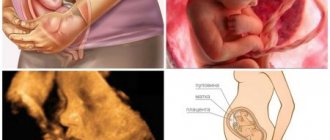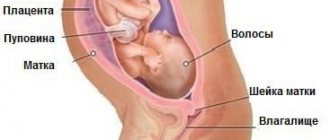The 16th week of pregnancy from the moment of conception corresponds to 18 obstetrics. Almost half of the gestation period is over. A little more, and the baby will be viable even if born. More details about the changes during this period can be found in the table.
Table - Interesting facts
| Options | Indications |
| Time from conception | 16 weeks |
| Period by month | 18 weeks |
| How many months | About 4.5 |
| Embryo dimensions | About 12-14 cm and about 100-110 g |
| Uterus dimensions | At the middle of the distance between the womb and the navel or slightly above |
| Pregnant weight | +400-500 g in a week or two |
What happens at 16 weeks of pregnancy in a woman’s body
The breasts are still sensitive and continue to grow.
The process of urination is normalized, and the intestines work slowly due to the flaccid muscle wall, resulting in constipation. They should not be allowed, as they often provoke abortion.
Under the influence of progesterone, some women develop pyelonephritis during this period. Sometimes it causes premature birth.
How many months is this?
The 16th week of pregnancy is the fourth month.
Fetus
Now the baby is able to hold his head in a straight position. The facial muscles have already finished forming. A fetus at 16 weeks of gestation reflexively frowns, opens its mouth, and winks.
The body has accumulated calcium, and now there is enough of it to strengthen the bones. The baby has joints in her limbs. His body and face are covered with fluff.
The skin is still transparent and small blood vessels can be seen through it. An ultrasound at 16 weeks will definitely show the gender of the baby.
The baby is often in motion, but the woman may not yet feel any movement. His heart beats 2 times faster than that of an adult, and his chest makes breathing movements.
The baby now has his own individual design on his fingers. The baby urinates every 40 minutes, and the amniotic fluid is regularly renewed. Sometimes the child plays with his legs and arms, stretches, spits, clenches his fingers into fists.
The adrenal glands are already producing the necessary hormones. Lymphocytes, monocytes and erythrocytes are present in the blood, and hemoglobin is synthesized. A baby at 16 weeks hears the voices of loved ones, sounds and music well.
The baby's nose is shaped, and his eyes and ears are in their proper place. The subcutaneous tissue continues to improve, and the baby’s body is covered with lubricant, which will help the baby pass through the birth canal.
How and when does the fetus move in the womb during a second pregnancy?
Regardless of the pregnancy, the fetus begins to move its limbs already at the 7th–8th week of the obstetric period. In the first trimester, the baby's nervous system develops so much that it begins to transmit impulses to the muscles. The movements are still unconscious and chaotic, and the fetus is so small that it is not possible to feel it. At this stage, fetal activity is detected only by ultrasound.
In the second trimester, the fetus is pushed away from the walls of the uterus and floats in the amniotic fluid. Its movements are still weak, but by the 16th–18th week an experienced multi-pregnant woman can feel them, because she already knows how the baby manifests itself.
During a second pregnancy, fetal movements may be felt a little earlier than during the first one.
According to obstetric standards, the period of the “first movement” of the fetus does not depend on the number of previous pregnancies. For women pregnant for the first time, and for women pregnant with their second and subsequent children, the norm is considered to be 18–24 weeks.
Most often, mothers feel the first movements of the fetus before going to bed in the evenings. This usually occurs between the 16th and 20th weeks of pregnancy. If this is the first pregnancy, then the woman may first feel the baby moving at 19–20 weeks; if the pregnancy is repeated or the mother has a fragile physique, then the baby may make itself known a little earlier - at 16–18 weeks. The very first movement of the fetus resembles the touch of a butterfly's wings or a gentle tickling. Some compare it to the sensation of gas passing through the intestines. Gradually the movements become stronger, more persistent and more noticeable.
Elena Pechnikova Obstetrician-gynecologist, antenatal clinic No. 102
https://www.9months.ru/beremennostbase/1193/o-chm-mogut-raskazat-sheveleniya-ploda
Often, inexperienced mothers confuse the sensations from the baby’s first movements with intestinal peristalsis and do not immediately detect them. From about the 22nd week, tremors usually become regular and obvious; they are difficult to confuse with the activity of the gastrointestinal tract, even when carrying the first child. According to reviews from mothers, in rare cases, during a second pregnancy, they notice kicks later than the first time.
Thin mothers with a second pregnancy usually feel the baby earlier than accepted norms
The period of fixation of movements is also influenced by such factors as:
- the woman’s physique (thin mothers usually notice the baby’s kicks earlier);
- fetal parameters (a large child makes itself known earlier);
- the individual sensitivity of the mother’s body (with an increased threshold of sensitivity, the woman notices movements earlier);
- volume of amniotic fluid (the greater the amount of amniotic fluid, the less noticeable the tremors).
It is likely that a thin mother carrying a large fetus will feel intrauterine movements earlier than a plump multipregnant woman. Each woman is individual, and her pregnancy proceeds according to a special scenario.
The nature of movements at different times
From the second half of gestation, the nature of the fetal movements felt does not depend on the number of pregnancies. The baby can clearly “manifest itself” in different parts of the abdomen. He pushes off the walls with his legs and touches the umbilical cord. With each subsequent week, the fetus becomes stronger and larger, slight movements give way to “kicks” and upheavals in the womb, when even the outside of the stomach changes configuration.
Periodically, the baby hiccups, which is why the stomach can shake rhythmically. Hiccups occur when amniotic fluid is swallowed. The baby's diaphragm reflexively contracts, trying to push out the amniotic fluid. This condition, like its absence, is a variant of the norm.
The tighter the fetus is in the uterus, the more the mother feels the movements.
At the beginning of the third trimester, the fetus still fits freely in the uterus and can turn over. However, by the 30–32nd week, the coups become less and less frequent, and the baby can already take a permanent position in the womb . If he is positioned head down, then the tremors are felt in the upper abdomen. With a breech presentation (feet down), the fetus is most often felt in the lower abdomen.
During these months, periods of sleep and wakefulness of the baby are clearly visible. It either calms down for several hours, then moves intensely. Often the baby reacts with active movements to the mother’s hunger or anxiety. You can even understand in what position of the body of the expectant mother the baby is uncomfortable - he begins to actively kick.
It is believed that at 20 weeks the baby moves about 200 times a day. At 28–32 weeks, activity reaches 600 movements. Of course, not every one of them is felt by the mother. However, from the 28th week, the feeling of 4-8 “kicks” in 1 hour is considered normal. Periods of calm lasting 3–4 hours are allowed when the baby is sleeping.
Shortly before birth, the baby's motor activity decreases. It completely takes up space in the uterus and there is no space left for somersaults. However, the movements do not stop - the baby can stretch his legs and arms, not only “outwards”, but also “inwards”, getting into the hypochondrium, pressing on the mother’s internal organs. Immediately before birth, the stomach drops, and the baby may calm down or, conversely, become more active than before.
Video: fetal movements at different stages
Feel
The condition and sensations at 16 weeks of pregnancy can be completely different. Some people at this time do not believe in their position.
Often, at 16 obstetric weeks, toxicosis subsides, but sometimes the expectant mother may experience nausea. Vomiting can still bother women expecting twins. If it does not go away during normal pregnancy, you need to contact a specialist and get recommendations on your diet.
Fetal movements
If the expectant mother is carrying a baby for the first time, then at 16 weeks it is normal not to feel fetal movements. They can appear only at 20 weeks. But even at this stage, many women already feel full movements, while the baby is either resting or awake, and can even lie low for several days.
Frozen pregnancy at 15 weeks
Due to the fact that there is no scheduled visit to the gynecologist, and home methods for diagnosing the condition of the fetus are not yet available (there is no movement yet), the death of a child in utero can be detected in two cases:
- When the fetus died, toxins from the uterus began to enter the blood. In this case, there may be an increase in temperature, chilliness, sweating, headaches and dizziness, sleep disturbances, nausea, vomiting, loose stools, thirst and frequent urination, bleeding gums. If the dead fetus continues to be in the uterus, significant blood clotting disorders occur. This can lead to extensive bleeding.
- In case of termination of pregnancy. It may begin with intense pain in the lower abdomen or with a slight pain that gradually intensifies. This occurs against the background of the cessation of most of the complaints that accompanied pregnancy (nipple engorgement, etc. stopped). A characteristic sign of an ongoing miscarriage is the appearance of bleeding. It can be of varying intensity. Bloody
discharge, including
brown, pink
, and red, indicates the presence of a tissue defect and bleeding.
What to do if your breasts stop hurting
and did any of the listed complaints appear? See a doctor immediately! The sooner medical assistance is received and the dead fetus is removed from the uterus, the higher the chances of maintaining health. If everything is done in a timely manner, the chance of getting pregnant and subsequently giving birth to a child reaches 90%.
Recommendations
The second trimester is all about laying the foundation for a prosperous third trimester. This will help during childbirth and subsequent feeding of the baby.
Nutrition
Fractional five or six meals a day should correspond in composition to the needs of the current period. Proteins, fats, carbohydrates, vitamins, microelements must be obtained by the fruit in the required quantities. At week 15, ossification (ossification of the skeleton), growth of limb bones, and development of the muscular system actively occur. Calcium is involved in all these processes. It is its supply that should be increased. There are several foods that are especially rich in calcium:
- It is especially preferable to eat dairy products.
You can choose your favorite product and increase its quantity or introduce several different dishes into your diet. Cottage cheese, milk, cheese (feta cheese, processed cheese, cheddar), sour cream, natural yogurt - each of them can become a source of calcium. - Canned fish
. The big advantage of this product is that when cooked, the bones become soft. They are also eaten, which significantly increases the calcium content of food. The same effect can be achieved if you cook fish (salmon, sardines, etc.) in a slow cooker. - Porridge
. Oatmeal and barley contain large amounts of calcium. They can be prepared for breakfast and used as side dishes for lunch and dinner. You should pay attention to the amount of sugar in the package if you need to cook instant cereals. - White beans and peas
. Perfect for soups, salads, vegetable appetizers, side dishes. - Nuts.
Almonds, hazelnuts, walnuts, pistachios - they all contain large amounts of calcium. They are great for adding to breakfast cereals, desserts and snacks throughout the day. When eating nuts, watch the amount of fat you get from food.
If there is a lack of calcium in food, the doctor will prescribe medications that contain vitamins and microelements. Otherwise, calcium will be “taken” from the woman’s bones and teeth.
Physical activity
No matter how busy you are, find time to exercise. Weight during pregnancy will increase from 9 to 15 kg. This in itself will already become a significant burden. Normal childbirth lasts up to 24 hours - it is a complex and difficult process of prolonged physical and emotional stress. After giving birth, there will be a need to carry the baby with accompanying accessories, and this is at least 5 kg, and even more with a stroller! Where can I get the strength for this? Right now, in the second trimester, a woman can physically get stronger, strengthen her muscles, and learn to relax. All this will be a huge help during pregnancy, during childbirth, and in later life. Moreover, now is the easiest period. It is favorable for sports.
Sex
Many women, upon learning about pregnancy, try to limit sexual activity. During the period of toxicosis, desire may decrease, but it is restored by the second trimester.
There are contraindications for having sex during pregnancy. They are of a medical nature. Their list is small: the threat of miscarriage, the presence of an active inflammatory process (gonorrhea, etc.), features of multiple pregnancy, the presence of a previous miscarriage (not always), etc. Contraindications are identified by the doctor. It is he who will recommend temporarily limiting sexual contact.
In all other cases, sexual relationships can bring many positive experiences:
- Increased blood supply to the genitals can lead to better sensitivity. In this case, it will be easier for a woman to experience an orgasm that will last longer.
- In the second trimester, sex gives a lot of pleasure also because the woman has already gotten used to pregnancy, toxicosis is no longer a concern, and the belly is not yet so large as to limit caresses.
- A woman does not need to worry about the effectiveness of contraception. Only the feelings of the partners are important.
- The baby, feeling the contraction of the uterus during orgasm, receives positive emotions and a kind of training for childbirth.
A feature of sex during pregnancy is a decrease in the speed of movements during sexual intercourse, avoidance of extreme positions and conditions of sex, as well as increased attention to hygiene.
If you follow these simple guidelines, sex during pregnancy can be an unforgettable experience for you and your partner.
Recommendations
During the gestation period, the expectant mother needs the care of loved ones. She also needs to give care to her baby and adhere to some recommendations.
Nutrition and weight
During the entire gestation process, the child and mother need adequate nutrition. The menu should include proteins, fats and carbohydrates that ensure proper development of the fetus at 16 weeks of pregnancy.
If there is not enough protein in the diet at week 16, this can lead to pathologies, anemia or miscarriage. Due to a lack of fat, the child’s nervous system often develops incorrectly.
With a lack of carbohydrates, the risk of frozen pregnancy at 16 weeks increases and metabolic processes decrease. The expectant mother should eat little and often. It is necessary to limit the consumption of sweet, salty, fatty and smoked foods.
On average, a woman gains 2.5 kg by this time.
Vitamins
The expectant mother needs to take a vitamin and mineral complex prescribed by a doctor. During this period, taking iodomarin is also important.
Based on the woman’s health, the specialist will determine what other beneficial components she needs. Undoubtedly, it is better to get them from natural fruits and vegetables.
Sex at 16 weeks pregnant
The period has come during which expectant mothers and fathers may not limit their intimate life. The dangerous time has passed, and now the risk of spontaneous miscarriage is minimized.
The expectant mother should know that when having sex at 16 weeks of pregnancy, you should be careful about your belly. Despite the minimal risk of miscarriage, expectant parents should still be careful.
In case of multiple pregnancy or if there is a threat of miscarriage, the specialist will recommend that the expectant mother avoid intimate relations.
Physical activity
At 16 obstetric weeks of pregnancy, doctors recommend continuing physical activity. But without fanaticism. If the expectant mother did not exercise before conception, then this should be taken into account and the load should be kept to a minimum. If she was seriously involved in sports before pregnancy, then she should not sharply reduce physical activity.
It is necessary that during the training process all the woman’s movements are smooth and unhurried. If the expectant mother feels tired at 16 weeks, she should rest until she feels better.
Medicines and medical procedures
The less the expectant mother takes medications, the lower the risk of subsequent problems with the development of the fetus at the 16th week of pregnancy and with its health in the future. Therefore, medications and medical procedures should only be used in emergency situations and only on the advice of a doctor.
If a woman has certain health problems, a specialist can choose the safest solution that will not affect the health of the expectant mother and baby.
Thus, some diseases are treated with the help of certain medicinal herbs. However, before taking them, you should consult a gynecologist.
Good to know for expectant mothers
The movements that the 16th week of pregnancy brought, which the pregnant woman may have begun to feel, will bring her not only joy, but will also help her better understand her baby. The movement of the fetus is its whole life. And already during this period the baby is familiar with the concept of comfort. For example, he may react by moving to external stimuli - bright lights or loud sounds.
The future baby begins to actively move, stimulating blood flow into the placenta if it feels a lack of nutrition and oxygen. This can occur if a woman lies on her back and the uterus compresses large blood vessels, thereby interfering with normal blood circulation, or the expectant mother is in a stuffy room with stale air.
The movement of the fetus at 16 weeks is also affected by the mother’s condition – physical and psychological. And if a woman is nervous, the baby will immediately react by moving. Stress can generally have a negative impact on the baby’s well-being, so the expectant mother should make an effort to reduce stress to a minimum. At 16 weeks the baby begins to hear sounds. It is believed that he reacts most to his mother's speech. The child is especially good at understanding intonation. Quarrels accompanied by shouting frighten him, but friendly conversation calms him down, so many recommend talking calmly with the unborn baby. It is also recommended that the expectant mother listen to classical or children's music. Whether the baby likes music or not, the woman can determine for herself. If he likes the musical rhythms, he will begin to move to the beat (as pregnant women sometimes say, “he is dancing”). If the child moves too intensely, perhaps the music does not give him pleasure.
Fetal movement at 16 weeks is an incomparable experience! Therefore, the expectant mother needs to enjoy it, learn to “communicate” with her baby, preparing him for birth!
» Baby's movements
Possible problems
At the 16th obstetric week of pregnancy, the expectant mother may suffer from constipation. This condition is dangerous for carrying a baby and can result in miscarriage. Therefore, a woman should tell her gynecologist about her problem. He will prescribe a balanced diet, and the expectant mother’s body will recover.
To make constipation a thing of the past, the expectant mother should eat foods high in fiber. Drinking plenty of fluids and a glass of kefir at night won't hurt.
Sometimes a frozen pregnancy occurs at 16 weeks. This happens for the following reasons:
- due to chromosomal abnormalities;
- in case of intrauterine infection of the baby;
- in case of Rh conflict between mother and child;
- from exposure to adverse environmental factors.
The doctor excludes a frozen pregnancy at 16 weeks by measuring the size of the uterus. If he suspects a problem, an ultrasound will be recommended for the expectant mother.
Discharge
Bleeding cannot be ruled out now. If this happens, you should definitely contact emergency services. Bloody discharge at the 16th week of pregnancy, intense pain in the abdomen, lower back or sides should also be a reason to immediately contact a specialist.
The expectant mother needs to monitor the color of the discharge. If they have a greenish tint or are accompanied by a large amount of mucus, you need to tell your gynecologist about it.
First movements at 15 weeks
Parents are eagerly awaiting the birth of their baby. Someone talks to him, stroking his stomach, someone sings lullabies at night. The only answer they can get is the feeling of the baby moving in the stomach. At first, the expectant mother feels it. As he gains strength, he will be able to move so intensely that vibrations in the surface of the abdomen can be felt when touched and even seen.
It is not surprising that the expectant mother strives with all her might to bring the touching moment of first physical contact with the baby closer, to feel it as early as possible. Thin women who have already given birth to children are more sensitive to movements in the abdomen. They know what to expect and can more easily recognize the movement of the tiny person in the uterus. They will be able to feel fetal movements early - at the 17th obstetric (15th calendar) week. Most women will begin to feel them during weeks 18-22. Is it possible to feel the baby's movements earlier? It is possible, but this is an extremely rare occurrence.
Some women feel the movement like the fluttering of the wings of several butterflies in the stomach, others, like the gliding of a fish, others, like a small pat, push or light pressure on one point, and still others, like a rumbling in the stomach. Whatever the sensations, they will remain in memory and when repeated they can be easily distinguished from all the others. All this will certainly happen, only later.
Analyzes
Every 2 weeks, the obstetrician-gynecologist sends the expectant mother to the laboratory to monitor blood and urine tests. If the gestation period proceeds normally, then the woman will not have to undergo additional tests at 16 weeks of pregnancy.
Ultrasound
Often, the expectant mother is prescribed an ultrasound at 16 weeks of pregnancy. At this time, she will find out the gender of the baby. Now, by the coccygeal-parietal size of the fetus, you can find out the approximate term and weight of the baby. Normally, the CTE is about 41 mm, and the size of the fetus at 16 weeks is about 16 cm.











